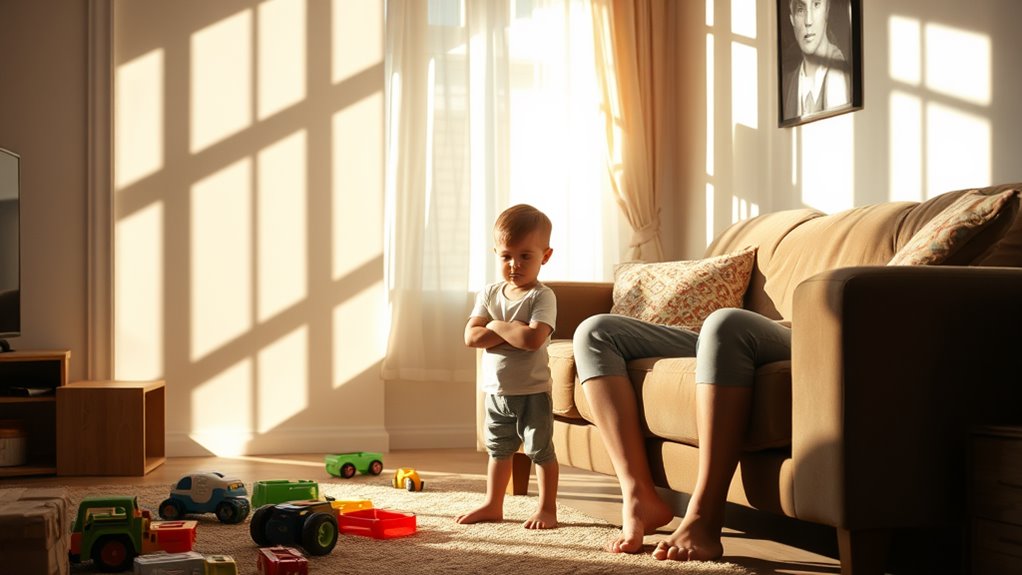The Importance of Consequences in Parenting
When you think about parenting, the concept of consequences often comes to mind, but have you considered their profound impact on your child’s development? Consequences serve as essential tools for teaching responsibility and accountability, allowing kids to understand the connection between their actions and outcomes. By implementing both natural and logical consequences, you’re not just disciplining; you’re fostering essential life skills. This approach can shape their behavior, but the balance between celebrating successes and addressing mistakes can be tricky. What strategies might you explore to guarantee your child grows into a responsible adult?
Understanding Consequences
When it comes to parenting, many agree that understanding consequences is essential. You see, knowing how your actions affect your child’s behavior is like having a superpower. It helps you guide them, teaching important life lessons along the way.
Imagine your kiddo decides to skip their chores. If you don’t address that, they might think skipping chores is okay. But when you explain that there’s a consequence, like losing screen time, they start to learn responsibility.
Understanding consequences isn’t just about punishment. It’s about helping your child grasp how their choices lead to certain outcomes. When you set clear expectations, you’re not just laying down the law; you’re giving them tools for their future. You want them to think, “If I do this, then that’ll happen,” and learn from it.
Think of it this way: you’re like a coach guiding your team. You help them see the plays and avoid the penalties. Plus, it’s a chance to bond! You can even make it fun, turning lessons into games or stories.
Types of Consequences
Consequences can be categorized into two main types: natural and logical.
Natural consequences happen without any interference from you. For example, if your child refuses to wear a coat on a chilly day, they’ll feel cold. They learn quickly that wearing a coat is a smart choice!
On the other hand, logical consequences are directly related to your child’s actions, and you play a role in setting them up. If your kid forgets to do their homework, a logical consequence could be losing video game time until it’s completed.
Both types help kids understand their choices. While natural consequences teach them about the world and its realities, logical consequences show them the link between actions and outcomes in a more structured way.
You might think of it as life’s little lessons, where kids get to learn without a long lecture from you.
The Role of Accountability
Accountability plays a significant role in helping children understand the impact of their actions. When you hold your kids accountable, they’re more likely to think about what they do. Imagine if you let them eat dessert before dinner every night. Sure, it sounds fun at first, but if they never learn that dinner is important, they might end up with a very unbalanced diet—yikes!
By showing accountability, you’re teaching your children that their choices have consequences. If they forget to do their homework, they should face the music, maybe by having to explain to their teacher why it’s missing. You’re not being mean; you’re helping them understand that actions matter. You want them to know that every choice can lead to a result, good or bad.
It’s all about balance, too. Celebrate their successes and hold them responsible for their missteps. This way, they’ll learn to own their actions, which builds confidence and trust.
Plus, it sets the stage for them to navigate the world, where accountability is key. So go ahead, make those tough calls! You’ll be shaping a more responsible future for them, one step at a time.
Teaching Responsibility
Teaching responsibility is essential for raising self-sufficient kids who can thrive in the real world. When you give your child tasks, like cleaning their room or completing homework, you’re not just assigning chores. You’re helping them learn the importance of following through. It’s like training for a big game; practice makes perfect!
Start with small responsibilities that match their age. Maybe they can help set the table or feed the family pet. Celebrate their successes, even if they’re small, to boost their confidence.
When mistakes happen (and they will!), use those moments as learning opportunities. Ask questions like, “What do you think you could’ve done differently?” This helps them think critically about their actions.
Also, be consistent with consequences. If they forget to take out the trash, remind them that it’ll need to wait until next time. You’re not being mean; you’re teaching them that actions have results, both good and bad.
Shaping Positive Behavior
Building on the foundation of responsibility, shaping positive behavior in your child can greatly influence their development and interactions with others. When you encourage good behavior, you’re not just teaching them right from wrong; you’re also helping them feel confident and valued.
Celebrating their small victories, like sharing toys or saying “please” and “thank you,” can go a long way. It’s like giving them a high-five for being awesome!
You might find it helpful to set clear expectations. When kids know what you expect, they’re more likely to meet those expectations. For instance, if you want them to clean up after playtime, make it a fun challenge. Maybe set a timer and see if they can beat the clock!
Also, be consistent. If you praise them for good behavior one day and ignore it the next, they might feel confused. Kids thrive on routine, just like we do!
Lastly, don’t forget to model positive behavior yourself. Remember, kids are like little sponges, soaking up everything they see. So, show them how to act kindly and respectfully, and watch them shine!
Natural vs. Logical Consequences
Consequences play a crucial role in helping children understand their actions and the impact they’ve on themselves and others.
When it comes to consequences, you’ll often hear about two types: natural and logical. Natural consequences happen without any intervention from you. For example, if your child refuses to wear a coat on a chilly day, they might end up feeling cold. This firsthand experience teaches them a lesson they won’t forget—sometimes, a little chill is all it takes!
On the other hand, logical consequences are set by you and are directly related to the child’s action. For instance, if they leave their toys out and a pet chews on them, you might let them know they need to take better care of their things. It’s all about connecting the dots between actions and outcomes.
Both methods are effective, but using a mix can be powerful. Natural consequences give kids a real-life lesson, while logical consequences help them understand the rules of your household.
Setting Clear Expectations
When it comes to effective parenting, setting clear expectations is essential for guiding your child’s behavior. Think of it as giving your child a map for traversing the sometimes tricky terrain of life. If they know what’s expected, they’re less likely to get lost along the way.
Start by discussing rules together. Make sure to explain why these rules matter. For example, if you say, “No screen time before homework,” let them know it helps them focus better. Kids love to understand the “why” behind things!
Use simple language and be specific. Instead of saying, “Be good,” try, “Please put your toys away after playing.” This way, they know exactly what you want them to do.
Remember, it’s not just about setting rules; it’s about being approachable. Encourage your child to ask questions if they’re confused. You might even find it fun to role-play different scenarios together!
Ultimately, when expectations are clear, your child feels more secure. They know what to aim for, and that confidence can lead to better choices. Plus, it saves you a lot of head-scratching moments later on!
Consistency in Parenting
Also, don’t forget to communicate! Explain why you’re being consistent.
Kids appreciate knowing what’s expected, and it helps them understand the “why” behind your rules. It’s like giving them a map to navigate their world.
So, whether you’re enforcing chores or screen time limits, keep it steady.
After all, even parents need a little consistency to keep things running smoothly!
Encouraging Growth Mindset
Nurturing a growth mindset in your children can transform the way they approach challenges and setbacks. Instead of feeling defeated when something gets tough, they’ll learn to see obstacles as opportunities to grow. You can help them by praising their effort rather than just the end result. When they try hard on a school project, let them know how much you appreciate their dedication. This encourages them to keep pushing, even when things don’t go perfectly.
Also, share stories of your own struggles. Tell them how you didn’t get it right the first time, but learned something valuable from the experience. It’s like when you bake a cake, and it flops—who hasn’t had that happen? But the next time, you might just nail it!
Encourage them to ask questions and be curious. Remind them that mistakes are just stepping stones on the path to success. When they see challenges as chances to learn, they’ll develop resilience and confidence.
And who wouldn’t want that? So, celebrate their efforts, share your stories, and watch them thrive!
Building Stronger Family Bonds
Fostering a growth mindset not only boosts your child’s resilience but also lays the groundwork for stronger family bonds. When you encourage your kids to see challenges as opportunities to learn, you create an atmosphere where everyone feels safe to express themselves.
Imagine sharing laughs over a failed science experiment instead of arguing about whose fault it was. That’s the magic of a growth mindset!
You can strengthen these bonds by spending quality time together. Whether it’s game nights, cooking together, or simply chatting about your day, these moments matter. They build trust and connection.
Plus, celebrating each other’s successes—big or small—creates a sense of unity.
Don’t forget, it’s okay to mess up sometimes! When you show your kids how to handle mistakes with grace, you model resilience.
And who knows? You might even find a little humor in your blunders, like the time you burned dinner!
All in all, by nurturing a growth mindset, creating fun family moments, and embracing mistakes, you’re not just parenting; you’re building a loving, supportive family that can weather any storm together.




